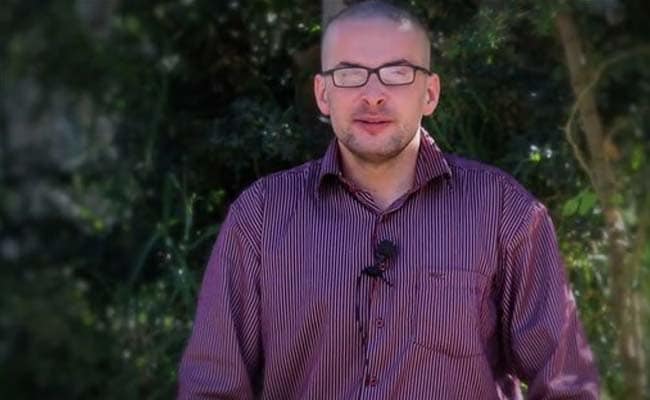
File photo of Luke Somers, an American photojournalist who was killed by Al-Qaeda in Yemen. (Associated Press)
Seattle:
An American photojournalist who US officials say was executed by al Qaeda militants in Yemen was a passionate free-thinker known for his rich portrayals of pro-Democracy protests and life, friends said today.
Luke Somers, 33, was shot along with a South African teacher by their captors shortly after a failed American-led rescue attempt overnight in a remote desert village in Yemen, US officials said.
"He had an intense curiosity. He was a young man grappling with big ideas," said Beloit College professor Shawn Gillen, who taught Somers creative writing and literature in 2007.
Somers was born in England, lived in the Seattle area in Washington state, where some of his family members still live, and graduated in 2008 from Beloit, in Wisconsin. He also lived in Egypt and Morocco.
His brother, Jordan, said in a YouTube video posted days ago seeking his release that Somers spent the last two years making Yemen his home.
"He goes out of his way to care for and respect the common person and has made many lasting friends in Yemen," Jordan said in the video.
His mother, Paula, added: "He is all that we have."
Neither immediately responded to interview requests today after his death was announced.
A Facebook page devoted to his release said his scholarly and personal interests led him to the Middle East. He was described as an English teacher and dedicated friend.
President Barack Obama said Somers was "a photojournalist who sought through his images to convey the lives of Yemenis to the outside world."
Somers chronicaled many aspects of Yemeni life, from the pro-Democracy protests in Sanaa, to Yemen's former president, to child malnutrition.
Fuad Shaif Al Kadas, who lunched with Somers the day before he was kidnapped, in September 2013, described him as quiet and private but funny.
"Luke truly cared about Yemenis and their voice ... spending all his time among the working-class Yemenis, those of us who really needed a voice (and) revolution," he said.
Tamarack Song, who hired Somers as an editor for a book of nature stories in 2007, said he was a "very complex" and "terribly intelligent" researcher driven to understand why some people hate others.
"His motivating force was trying to understand the human psyche, why people are driven to be conflicted about religion, politics, boundaries," Song said. "He was dragged right in there."
Luke Somers, 33, was shot along with a South African teacher by their captors shortly after a failed American-led rescue attempt overnight in a remote desert village in Yemen, US officials said.
"He had an intense curiosity. He was a young man grappling with big ideas," said Beloit College professor Shawn Gillen, who taught Somers creative writing and literature in 2007.
Somers was born in England, lived in the Seattle area in Washington state, where some of his family members still live, and graduated in 2008 from Beloit, in Wisconsin. He also lived in Egypt and Morocco.
His brother, Jordan, said in a YouTube video posted days ago seeking his release that Somers spent the last two years making Yemen his home.
"He goes out of his way to care for and respect the common person and has made many lasting friends in Yemen," Jordan said in the video.
His mother, Paula, added: "He is all that we have."
Neither immediately responded to interview requests today after his death was announced.
A Facebook page devoted to his release said his scholarly and personal interests led him to the Middle East. He was described as an English teacher and dedicated friend.
President Barack Obama said Somers was "a photojournalist who sought through his images to convey the lives of Yemenis to the outside world."
Somers chronicaled many aspects of Yemeni life, from the pro-Democracy protests in Sanaa, to Yemen's former president, to child malnutrition.
Fuad Shaif Al Kadas, who lunched with Somers the day before he was kidnapped, in September 2013, described him as quiet and private but funny.
"Luke truly cared about Yemenis and their voice ... spending all his time among the working-class Yemenis, those of us who really needed a voice (and) revolution," he said.
Tamarack Song, who hired Somers as an editor for a book of nature stories in 2007, said he was a "very complex" and "terribly intelligent" researcher driven to understand why some people hate others.
"His motivating force was trying to understand the human psyche, why people are driven to be conflicted about religion, politics, boundaries," Song said. "He was dragged right in there."
© Thomson Reuters 2014
Track Latest News Live on NDTV.com and get news updates from India and around the world

